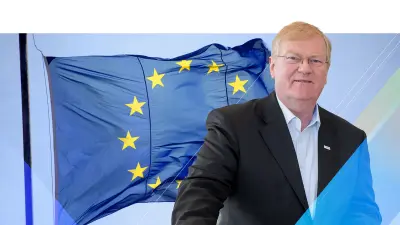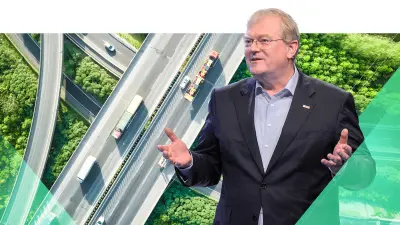The unicorn that is Europe

2024-06-07
There shouldn’t really be any need for this article. By now, all of us should have realized what’s at stake on June 9. When we elect the European Parliament next weekend, the issue won’t be how bendy our cucumbers are, but our prosperity. It won’t be about how many bureaucrats work in Brussels, but about job security in 27 countries. Not about a ban on light bulbs, but about the future of Europe in an unstable world.
by Stefan Hartung
chairman of the board of management of Robert Bosch GmbH
Unfortunately, however, the polls suggest that voting decisions are too often guided by trivialities and not by a level-headed assessment of the bigger picture. It’s crucial that we have a clear idea of what’s at stake on Sunday.
First and foremost, we must highlight the major issues of peace and international relations, which seem more important today than they did just a few years ago. In fact, it’s probably not worth debating with anyone who fails to recognize the EU’s achievements in this respect. But we must also consider how crucial a functioning EU is for the economy, and thus for the prosperity of every single country in the union.
Some time ago, the Kiel Institute for the World Economy calculated that the single market alone makes the EU countries 643 billion euros richer every year. And Germany is by no means the “paymaster” of the EU, as is so often claimed. True, Berlin does send more money to Brussels than other governments, but hardly any other country benefits as much from free trade in Europe as we do. More than half of German exports go to the single market — which, according to the German government, contributes a good 1,000 euros a year to our country’s per capita income. The total value created for the German economy thus amounts to nearly 70 billion euros. This shouldn’t be forgotten, especially in a country where one in four jobs depends on exports.

If we want to maintain this prosperity — also on an individual level — then we must continue to commit ourselves to the globalization and cultural openness of our continent. This is why Bosch has joined the “We stand for values” alliance, in which more than 30 German companies and organizations have made a clear commitment to a united Europe. And a strong EU is by no means solely in the interests of large corporations. Brussels regulations have enshrined many workers rights in particular, from minimum vacation time to maximum working hours.
So everything in the EU is golden, like the stars on the European flag? Of course not! There’s a grain of truth in complaints about a tendency toward overregulation combined with occasional weakness in decision-making. And there are plenty of people longing for more decisiveness in the advocacy of key technologies such as AI or hydrogen. Moreover, many companies, German ones included, are also known to be less than enthusiastic about some finicky EU specifications. Nonetheless, the fact that European countries have joined together to form an economic area is something that thrills me — not just as an individual, but also as a businessperson. Last year, Bosch generated sales of nearly 47 billion euros in Europe. That’s just over half our total group sales. Without the free exchange of people, goods, and services within Europe, it’s unlikely we would be able to generate sales of this magnitude.

The only way we Europeans can counter geopolitical risks and the dangers on our doorstep is by working together. And only a strong Europe will give its member states the support they need to make necessary reforms. Education, controlled immigration, and a cohesive security policy are the key issues here. So if we want an EU that is more capable of taking action in a crisis, that makes clear and comprehensible decisions, that can act as a credible counterweight to populism and autocracy, then we must safeguard it against destructive tendencies. A unified Europe is a stroke of luck, as improbable as the mythical unicorn, and just as delicate and sensitive even after so many years. The last thing a miracle like this needs is the bludgeon of radical politics.
And by the way, the directive governing cucumber curvature has long since been abolished without replacement. Where there’s a will, there’s a way.


